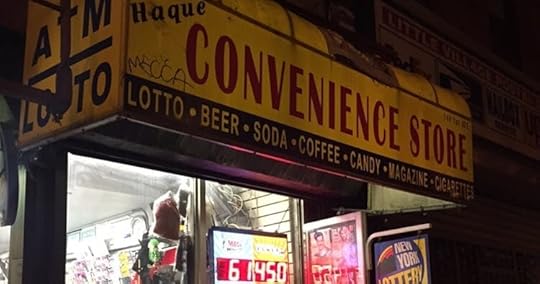Explaining the Changing Signs in Déjà View

WARNING: Do NOT read this blog if you haven’t read Déjà View yet, unless you’re one of those types who don’t care about spoilers, in which case, you do you.
I should’ve included this information in my Déjà View FAQ blog several months ago, but I’m only getting around to it now. One of the major questions people had about Déjà View was the changing store signs: “Why do the signs keep changing from “BEER/COFFEE/CIGARETTES/CANDY/LOTTO” to “ALCOHOL/CAFFEINE/NICOTINE/SUGAR/GAMBLING”?
If you recall, Bobby first sees the sign, in its original form, above his favorite stationery store, but later on in the story, after his “déjà view” visions kick in, the letters start rearranging themselves. This happens several times in the story, a phenomenon even his later friend/partner-in-crime/would-be love interest Anna sees, until it’s mentioned one final time in the book’s climax, the sign now permanently reading its latter incarnation (the one starting with “ALCOHOL/CAFFEINE…,” etc.).
To cut right to the chase, this is all based on a similar experience I…um, experienced. Letters in signs didn’t magically rearrange themselves of course, but I noticed when I was younger that most convenience stores displayed signs outside that advertised the same items, over and over again: beer, coffee, cigarettes, candy, and lotto—no matter where you went, even which state you were in (though the products weren’t necessarily in that order). When I was younger, I thought it was cool that a small place could offer up such a wide variety of items. It truly seemed like a magical world.
It wasn’t until much later, in my cynical teens, when I realized WHY those items are presented over the door of most local delis, stationery stores, and markets in this country. It’s because they SELL the most. And the reason why they sell the most is because they’re the most addictive. Even if it’s harmful to you, such as the case with beer and cigarettes, the storeowner doesn’t care; he just wants to make a living. So the real items that the storeowner is hawking are the addictions that those cash-cow staple items represent: alcohol, caffeine, nicotine, sugar, and gambling. Us suckers are going to keep coming back and plunking down our hard-earned cash to get our latest fix. Hey, I’m not judging; I’m just as susceptible as everyone else. Every weekend, in fact, I buy two six-packs of beer to last me the week. The storeowner (my dealer?) knows me by name.
It was one of the first times my eyes were open to what was really going on in the world: everyone is basically out for themselves and only interested in making a buck, at least when it comes to business. In other words, the innocent, fun-times happy place that young Bobby once believed he lived in is shattered, and he finally sees the “horror” of the real world. Growing up, of course, is the entire theme of Déjà View (if you’re paying attention, at least), which is why this plot point is emphasized so many times. I really wanted to drive it home, but at least a few of you were confused (hence, this blog). Hopefully, I’ve cleared things up. Now you know, and as G.I. Joe once said at the end of every episode: “Knowing is half the battle.”
MTP
P.S.: Next week’s blog: The Beta Feedback of My Latest Book Has Arrived, and It’s a Glass Case of Emotion!
P.P.S.: Déjà View is now available on Amazon and Barnes & Noble:
AmazonBarnes & Noble


